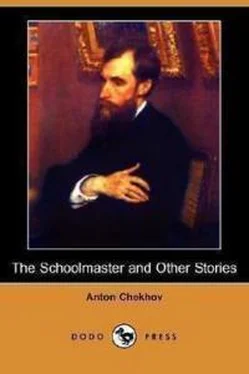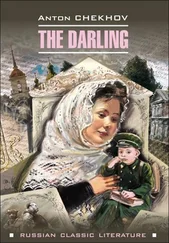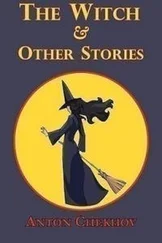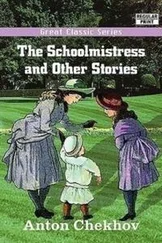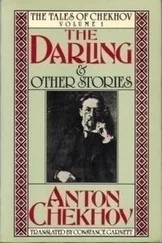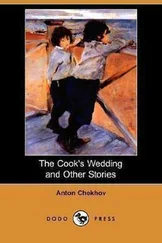Zapoikin continued while his listeners began whispering together. His speech pleased everyone and drew some tears, but a good many things in it seemed strange. In the first place they could not make out why the orator called the deceased Prokofy Osipitch when his name was Kirill Ivanovitch. In the second, everyone knew that the deceased had spent his whole life quarelling with his lawful wife, and so consequently could not be called a bachelor; in the third, he had a thick red beard and had never been known to shave, and so no one could understand why the orator spoke of his shaven face. The listeners were perplexed; they glanced at each other and shrugged their shoulders.
"Prokofy Osipitch," continued the orator, looking with an air of inspiration into the grave, "your face was plain, even hideous, you were morose and austere, but we all know that under that outer husk there beat an honest, friendly heart!"
Soon the listeners began to observe something strange in the orator himself. He gazed at one point, shifted about uneasily and began to shrug his shoulders too. All at once he ceased speaking, and gaping with astonishment, turned to Poplavsky.
"I say! he's alive," he said, staring with horror.
"Who's alive?"
"Why, Prokofy Osipitch, there he stands, by that tombstone!"
"He never died! It's Kirill Ivanovitch who's dead."
"But you told me yourself your secretary was dead."
"Kirill Ivanovitch was our secretary. You've muddled it, you queer fish. Prokofy Osipitch was our secretary before, that's true, but two years ago he was transferred to the second division as head clerk."
"How the devil is one to tell?"
"Why are you stopping? Go on, it's awkward."
Zapoikin turned to the grave, and with the same eloquence continued his interrupted speech. Prokofy Osipitch, an old clerk with a clean–shaven face, was in fact standing by a tombstone. He looked at the orator and frowned angrily.
"Well, you have put your foot into it, haven't you!" laughed his fellow–clerks as they returned from the funeral with Zapoikin. "Burying a man alive!"
"It's unpleasant, young man," grumbled Prokofy Osipitch. "Your speech may be all right for a dead man, but in reference to a living one it is nothing but sarcasm! Upon my soul what have you been saying? Disinterested, incorruptible, won't take bribes! Such things can only be said of the living in sarcasm. And no one asked you, sir, to expatiate on my face. Plain, hideous, so be it, but why exhibit my countenance in that public way! It's insulting."
MARFA PETROVNA PETCHONKIN, the General's widow, who has been practising for ten years as a homeopathic doctor, is seeing patients in her study on one of the Tuesdays in May. On the table before her lie a chest of homeopathic drugs, a book on homeopathy, and bills from a homeopathic chemist. On the wall the letters from some Petersburg homeopath, in Marfa Petrovna's opinion a very celebrated and great man, hang under glass in a gilt frame, and there also is a portrait of Father Aristark, to whom the lady owes her salvation —that is, the renunciation of pernicious allopathy and the knowledge of the truth. In the vestibule patients are sitting waiting, for the most part peasants. All but two or three of them are barefoot, as the lady has given orders that their ill–smelling boots are to be left in the yard.
Marfa Petrovna has already seen ten patients when she calls the eleventh: "Gavrila Gruzd!"
The door opens and instead of Gavrila Gruzd, Zamuhrishen, a neighbouring landowner who has sunk into poverty, a little old man with sour eyes, and with a gentleman's cap under his arm, walks into the room. He puts down his stick in the corner, goes up to the lady, and without a word drops on one knee before her.
"What are you about, Kuzma Kuzmitch?" cries the lady in horror, flushing crimson. "For goodness sake!"
"While I live I will not rise," says Zamuhrishen, bending over her hand. "Let all the world see my homage on my knees, our guardian angel, benefactress of the human race! Let them! Before the good fairy who has given me life, guided me into the path of truth, and enlightened my scepticism I am ready not merely to kneel but to pass through fire, our miraculous healer, mother of the orphan and the widowed! I have recovered. I am a new man, enchantress!"
"I … I am very glad … " mutters the lady, flushing with pleasure. "It's so pleasant to hear that…Sit down please! Why, you were so seriously ill that Tuesday."
"Yes indeed, how ill I was! It's awful to recall it," says Zamuhrishen, taking a seat. "I had rheumatism in every part and every organ. I have been in misery for eight years, I've had no rest from it … by day or by night, my benefactress. I have consulted doctors, and I went to professors at Kazan; I have tried all sorts of mud–baths, and drunk waters, and goodness knows what I haven't tried! I have wasted all my substance on doctors, my beautiful lady. The doctors did me nothing but harm. They drove the disease inwards. Drive in, that they did, but to drive out was beyond their science. All they care about is their fees, the brigands; but as for the benefit of humanity—for that they don't care a straw. They prescribe some quackery, and you have to drink it. Assassins, that's the only word for them. If it hadn't been for you, our angel, I should have been in the grave by now! I went home from you that Tuesday, looked at the pilules that you gave me then, and wondered what good there could be in them. Was it possible that those little grains, scarcely visible, could cure my immense, long–standing disease? That's what I thought—unbeliever that I was!—and I smiled; but when I took the pilule—it was instantaneous! It was as though I had not been ill, or as though it had been lifted off me. My wife looked at me with her eyes starting out of her head and couldn't believe it. 'Why, is it you, Kolya?' 'Yes, it is I,' I said. And we knelt down together before the ikon, and fell to praying for our angel: 'Send her, O Lord, all that we are feeling!'"
Zamuhrishen wipes his eyes with his sleeve gets up from his chair, and shows a disposition to drop on one knee again; but the lady checks him and makes him sit down.
"It's not me you must thank," she says, blushing with excitement and looking enthusiastically at the portrait of Father Aristark. "It's not my doing…. I am only the obedient instrument . . It's really a miracle. Rheumatism of eight years' standing by one pilule of scrofuloso!"
"Excuse me, you were so kind as to give me three pilules. One I took at dinner and the effect was instantaneous! Another in the evening, and the third next day; and since then not a touch! Not a twinge anywhere! And you know I thought I was dying, I had written to Moscow for my son to come! The Lord has given you wisdom, our lady of healing! Now I am walking, and feel as though I were in Paradise. The Tuesday I came to you I was hobbling, and now I am ready to run after a hare…. I could live for a hundred years. There's only one trouble, our lack of means. I'm well now, but what's the use of health if there's nothing to live on? Poverty weighs on me worse than illness…. For example, take this … It's the time to sow oats, and how is one to sow it if one has no seed? I ought to buy it, but the money … everyone knows how we are off for money…."
"I will give you oats, Kuzma Kuzmitch…. Sit down, sit down. You have so delighted me, you have given me so much pleasure that it's not you but I that should say thank you!"
"You are our joy! That the Lord should create such goodness! Rejoice, Madam, looking at your good deeds! … While we sinners have no cause for rejoicing in ourselves…. We are paltry, poor–spirited, useless people … a mean lot…. We are only gentry in name, but in a material sense we are the same as peasants, only worse…. We live in stone houses, but it's a mere make–believe … for the roof leaks. And there is no money to buy wood to mend it with."
Читать дальше
